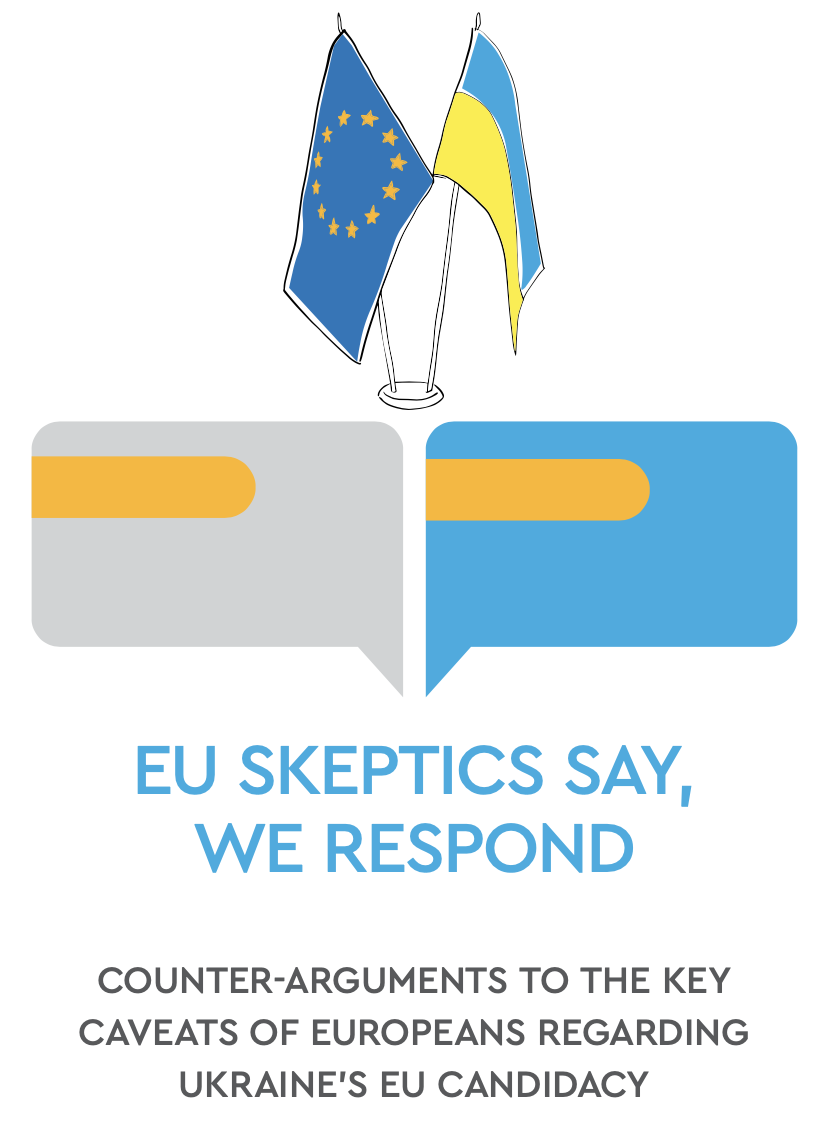On June 23-24, the European Council will decide whether to grant Ukraine the EU candidate status. There is a number of caveats in European capitals concerning this step. The New Europe Center prepared counter-arguments to the key caveats of Europeans regarding Ukraine’s EU candidacy.
PDF is available via the link here.
№1 EU skeptics say: “The EU must first reform itself. The enlargement list cannot be expanded until the reform of the European Union is completed.”
Ukrainians respond: “Let’s reform simultaneously. Ukraine’s candidate status will by no means prevent the EU from carrying out its internal reform.”
Ukraine will not become an EU member and will not have a voice in the structures of the Union tomorrow. Candidacy is just the beginning of the path to membership. Therefore, granting Ukraine the candidate status will not affect the EU’s decision-making process and will not hinder the Union’s internal reform.
Realizing the challenges facing the EU today, Ukraine is ready for a phased (gradual) EU integration after obtaining the candidate status by dividing the accession process into several stages, namely candidacy, opening negotiation chapters, joining the single market and the four freedoms and only then membership.
In addition, already at the negotiation stage Ukraine and the EU will be able to think together about creative and mutually acceptable solutions for a gradual institutional integration. For example, Ukraine’s voice could be taken into account in the Council of the European Union when voting by a qualified majority, but Ukraine would refrain from imposing an individual veto, etc.[1]
Kyiv is aware of the need to reform the EU’s decision-making process; one country cannot undermine the unity of most member states. In this case, Ukraine is an ally of most EU members, not an opponent. The EU should not transfer its negative experience with Hungary to Ukraine: it will undermine the EU’s credibility as a normative power and an association guided in its policies by values and rules.
Reform is a complex process: there will always be countries that serve as role model of change and those backsliding. Ukraine’s robust civil society, which has always been an ally of the EU in advancing the reform agenda, will do its utmost to make Ukraine part of the camp with irreversible success in key areas.
An important clarification: Ukraine has repeatedly proved that it is a team player. Even without a European prospect and EU candidacy, Ukraine last year joined 93.27% of the European Union’s statements on international developments and approaches to resolving them.
№2 EU skeptics say: “Ukraine’s EU candidacy is unfair to the Western Balkans, which have been part of the EU integration process for much longer. Every major step towards Ukraine must be met with a major step towards the countries of the Western Balkans.”
Ukrainians respond: “The candidate status for Ukraine will give new impetus to enlargement policy, pushing the EU to reform its decision-making, which partially blocks the EU-Western Balkans dialogue, on the one hand, and prompting candidate countries to pursue internal reforms on a competitive basis, on the other.”
Firstly, by gaining the EU candidate status, Ukraine will not be ahead of the Western Balkan countries, which have long had this status (North Macedonia – since 2005, Montenegro – since 2010, Serbia –since 2012, Albania – since 2014) and enjoyed its benefits (particularly, the financial Instrument for Pre-accession Assistance – IPA). Some of them have even started accession negotiations. Having received the candidate status, Ukraine will climb only the first step that the countries of the Western Balkans have already passed.
Secondly, it is unfair to hold Ukraine hostage to the EU-Western Balkans dialogue, which has reached a stalemate due to: 1) political contradictions between member states and candidate countries (North Macedonia – Bulgaria), 2) lack of internal EU reform (the main obstacle for Montenegro, which is ready to join), 3) the slow pace of reforms in the candidate countries.
“Accession is and will remain a merit-based process fully dependent on the objective progress achieved by each country. The countries may catch up or overtake each other depending on progress made,” the European Commission said in a 2018 statement on the European integration of the Western Balkans.[2] Therefore, it is fair to link Ukraine’s progress with its progress in implementing reforms, and not with the progress of other candidate countries. An illustrative example from the history of the EU is Finland. Although it applied for membership later than Cyprus (1992 vs. 1990), it joined the EU earlier, together with Austria and Sweden in 1995, while Cyprus, alongside Estonia, Latvia, Poland and others, did so in 2004. Therefore, the application deadline does not always determine the wave of enlargement and the order of accession.
Finally, the candidate status for Ukraine will give a new impetus to the enlargement policy and will direct the implementation of reforms not only in Ukraine but also in the Western Balkans on a competitive basis. And as soon as the EU carries out its internal reform, the dialogue with the Western Balkans will be unblocked.
№3 EU skeptics say: “Ukraine is not ready for candidacy. For such a step, Ukraine needs to show more progress in the fight against corruption and the rule of law reform.”
Ukrainians respond: “Ukraine is not ready for EU membership, but it is fully qualified to receive the candidate status. Ukraine meets the basic Copenhagen criteria, and the level of its integration with the EU is already deeper than in the vast majority of countries at the time when they acquired such status (at the time of receiving the candidate status in 1999, Turkey still had not abolished death penalty).
Despite the full-scale Russian aggression, Ukrainian state institutions have shown resilience and the ability to work even in wartime. All recent elections in Ukraine have been democratic, as confirmed by reports from international organizations (ODIHR / OSCE). This proves that Ukraine meets the basic Copenhagen political criteria, as it seeks to develop its democracy in accordance with EU rules and values.
European integration began in Ukraine long before the application for EU membership. Kyiv officially started approximating its legislation to EU laws more than twenty years ago. Since 2014, Ukraine has been implementing the Association Agreement, which provides for up to 90% integration into the EU’s single market in economic and trade terms. Ukraine has already fulfilled 63% of its obligations under the agreement.[3]
Thanks to another document aimed at European integration – the Visa Liberalization Action Plan with the EU – Ukrainians have been able to launch independent anti-corruption institutions (including the National Anti-Corruption Bureau, the Specialized Anti-Corruption Prosecutor’s Office and the National Anti-Corruption Agency). One of the most detailed electronic declaration systems for civil servants in the world has also been introduced, which now has several million civil servants’ declarations and allows state institutions and independent investigators to effectively detect corruption. Another recognized accolade is the creation of the ProZorro automated electronic public procurement system, which in its five years of existence has saved the state budget of Ukraine UAH 150 billion (about EUR 5 billion).
In 2019, as part of the judicial reform in Ukraine, the Supreme Anti-Corruption Court was formed on a unique principle: a decisive vote in the selection of candidates was given to a commission of independent international experts. Of the 38 judges selected to the court out of 343 candidates, none had serious complaints from relevant NGOs. To date, the court has handed down 70 convictions in cases of top-level corruption against judges, prosecutors, deputy ministers, MPs and heads of state-owned enterprises. In 2021, this approach was extended to the entire judiciary, and the main judicial body, the High Council of Justice, was almost completely cleared of old corrupt members. At the moment, despite the war, there are ongoing competitions to fill vacancies in the High Council of Justice in which independent foreign experts will also have a decisive voice.
Ukraine has proved that it is able to integrate into the EU on a sectoral basis at an accelerated pace and even in times of crisis. Even in the face of military aggression, Ukraine was able to integrate its energy network into ENTSO-E already after the first test.
Ukrainians themselves are interested in the merit-based approach, which involves joining the EU on the grounds of relevant achievements. Ukraine is ready to fulfill all the necessary preconditions and go through all the required stages in order to finally achieve the main goal: membership. By the way, more than 200 non-governmental organizations of Ukraine, including those promoting the anti-corruption and judicial reforms, support granting the country the candidate status at the European Council meeting on June 23–24, since such a decision will contribute to further success in the aforesaid areas.[4]
№4 EU skeptics say: “It is important to avoid politicizing the process: there must be strict adherence to all EU enlargement procedures and rules.”
Ukrainians respond: “Ukraine is ready to go through all the stages for EU membership. We are not talking about any shortcuts.”
The Ukrainian side respects the EU enlargement procedures, is already implementing them and is ready to do so in the future. Ukraine has applied for EU membership, completed the European Commission’s questionnaire in record time and is awaiting its conclusion. According to authorized representatives of the government and the parliament for European integration, the Ukrainian side is aware of the next stages of membership it will have to go through, and is ready for it.
At the same time, speaking at the beginning of the full-scale Russian invasion about the fast-track EU accession procedure, the Ukrainian authorities meant not “jumping over” certain stages but Ukraine’s readiness to move towards membership quickly and effectively within established procedures.
№5 EU skeptics say: “Giving Ukraine the candidate status will further provoke Putin and will not help resolve the conflict with Russia.”
Ukrainians respond: “It is the uncertainty about Ukraine’s future that allows Putin to dream of occupying our state and emboldens him to continue the war with hope.”
In 2014, Ukraine sought a diplomatic dialogue with Russia, but eventually de facto lost control of Crimea and some areas in the east. Volodymyr Zelenskyi began his presidency with a number of compromise solutions: he made concessions within the framework of the Minsk agreements (agreed to the “Steinmeier formula”), initiated a unilateral withdrawal of Ukrainian troops in June 2019 in Donbas, avoided the words “aggressor” and “occupation”. During talks with the Russians in Istanbul on March 29, Ukraine announced its readiness to abandon its strategic course towards NATO. In response, Russia launched a powerful military offensive in eastern Ukraine. The policy of “non-provocation” led to the opposite effect in the case of Vladimir Putin – to greater aggression and to greater expansionist decisions by Russia.
In 2008, NATO countries denied Ukraine and Georgia a Membership Action Plan. As a result, Russia attacked Georgia in August the same year. In 2014, Western countries refused to impose tough sanctions, instead choosing to appease the Russian leadership; hence Russia’s full-scale war against Ukraine. Only the absolute strategic determination and resolution of the European Union towards Ukraine will lead to the end of the Kremlin’s revanchist policy. Giving Ukraine the candidate status will be a signal to Russia that Ukraine is not alone. The desire of the Ukrainian people for European integration has been supported by 27 EU member states. Conversely, turning Ukrainians down would be a historic mistake that would only increase Moscow’s militaristic appetites.
The policy of “not provoking Putin,” which has been practiced for a lot of years in many world’s capitals, has proved completely ineffective and has in fact provoked a full-scale war. It is time to try other approaches, without half-hearted decisions on Ukraine.
The EU’s refusal to grant Ukraine the candidate status will be used by the Kremlin as an argument in a propaganda war to sow disappointment and despair among Ukrainians. The candidate status, meanwhile, will strengthen Ukraine’s negotiating position, as Russia will receive a clear signal of Ukraine’s and the EU’s strategic choices. Refusal, on the other hand, will weaken Ukraine, whilst also demonstrating Moscow’s virtual right to veto EU decisions.
№6 EU skeptics say: “The issue of Ukraine’s candidacy does not contribute to the unity of the EU, which is already affected by the issue of imposing an oil embargo on Russia.”
Ukrainians respond: “The societies of the vast majority of EU member states are in favor of seeing Ukraine in the EU in the future. That is why EU leaders simply have to legitimize the public expectations of their fellow citizens.”
71% of citizens surveyed in EU member states believe that Ukraine is part of the European family.[5]66% of respondents said that Ukraine should join the EU when it were ready.[6] In Germany, the figure stands at 61%, in France – 56%, in the Netherlands – 62%. By the way, on March 1, the European Parliament, which represents the interests of about 500 million EU citizens, supported by an unprecedented majority the resolution granting the candidate status to Ukraine, with 637 MEPs out of 705 voting in favor.[7]
It is failure to grant Ukraine the candidate status that will divide Europeans: it will show that EU politicians are acting undemocratically and do not listen to their citizens. EU leaders will face the threat of massive criticism from their own citizens and the world’s press. German Chancellor Olaf Scholz, who, from the point of view of German society, has been slow and hesitant in providing arms to Ukraine, has come under a barrage of criticism, and the Social Democratic Party has begun to lose its electorate.[8] Interestingly, it is among the voters of the German Social Democrats, represented by Scholz, that the highest level of support for Ukraine’s future EU membership is observed; as foroppositional Christian Democrats, this figure is slightly lower (79% vs. 71%).[9]
The lack of clarity about Ukraine’s future will lead to Russia continuing to undermine European unity using the tools of hybrid warfare, which it did in the EU before, as exemplified by cyberattacks on government authorities (Estonia, 2007; Germany, 2015), interference in German political processes through disinformation attacks – the so-called Lisa case (2016), interference in the French presidential election (2017), killings of or assaults on citizens in the United Kingdom (2006; 2018), explosions at ammunition depots in the Czech Republic (2014).
[1] https://www.ceps.eu/ceps-publications/opinion-on-ukraines-application-for-membership-of-the-european-union/
[2] https://ec.europa.eu/info/sites/default/files/communication-credible-enlargement-perspective-western-balkans_en.pdf
[3] https://www.ukrinform.ua/rubric-polytics/3392395-ukraina-na-63-vikonala-ugodu-pro-asociaciu-z-es-smigal.html
[4] http://neweurope.org.ua/zvernennya-ukrayinskyh-gromadyanskyh-organizatsij-do-lideriv-z-yes/
[5] https://europa.eu/eurobarometer/surveys/detail/2772
[6] https://europa.eu/eurobarometer/surveys/detail/2772
[7] https://www.europarl.europa.eu/news/en/press-room/20220227IPR24205/invasion-of-ukraine-meps-call-for-tougher-response-to-russia
[8] https://www.bloomberg.com/news/articles/2022-06-01/scholz-touts-latest-ukraine-arms-delivery-as-criticism-persists
[9] https://www.ukrinform.ua/rubric-world/3429820-u-cotiroh-evropejskih-krainah-71-gromadan-za-vstup-ukraini-do-es.html








